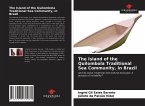A way of subjugating, of expressing feelings, of showing power, of humiliating. Violence between human beings is the result of a cultural need to feel superior to others. In violence against women we call it machismo. The Maria da Penha Law was a major step forward in tackling violence against women. It is now 10 years old and I'm curious? Are its objectives being achieved? This work brings up some points about tackling this type of oppression against women and makes it possible to reflect on the situation of Brazilian women and the obstacles that still need to be overcome if gender equality is to be achieved in the country.
Bitte wählen Sie Ihr Anliegen aus.
Rechnungen
Retourenschein anfordern
Bestellstatus
Storno








